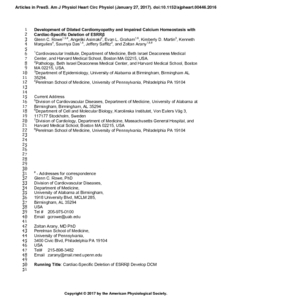Rowe, GC; Asimaki, A; Graham, EL; Martin, KD; Margulies, KB; Das, S; Saffitz, J; Arany, Z
(2017)
Development of dilated cardiomyopathy and impaired calcium homeostasis with cardiac-specific deletion of ESRRβ.
Am J Physiol Heart Circ Physiol, 312 (4).
H662-H671.
ISSN 1522-1539
https://doi.org/10.1152/ajpheart.00446.2016
SGUL Authors: Asimaki, Angeliki
![[img]](https://openaccess.sgul.ac.uk/108940/7.hassmallThumbnailVersion/ajpheart00446.pdf)  Preview |
|
PDF
Accepted Version
Available under License ["licenses_description_publisher" not defined].
Download (1MB)
| Preview
|
Abstract
Mechanisms underlying the development of idiopathic dilated cardiomyopathy (DCM) remain poorly understood. Using transcription factor expression profiling, we identified estrogen-related receptor-β (ESRRβ), a member of the nuclear receptor family of transcription factors, as highly expressed in murine hearts and other highly oxidative striated muscle beds. Mice bearing cardiac-specific deletion of ESRRβ (MHC-ERRB KO) develop DCM and sudden death at ~10 mo of age. Isolated adult cardiomyocytes from the MHC-ERRB KO mice showed an increase in calcium sensitivity and impaired cardiomyocyte contractility, which preceded echocardiographic cardiac remodeling and dysfunction by several months. Histological analyses of myocardial biopsies from patients with various cardiomyopathies revealed that ESRRβ protein is absent from the nucleus of cardiomyocytes from patients with DCM but not other forms of cardiomyopathy (ischemic, hypertrophic, and arrhythmogenic right ventricular cardiomyopathy). Taken together these observations suggest that ESRRβ is a critical component in the onset of DCM by affecting contractility and calcium balance.NEW & NOTEWORTHY Estrogen-related receptor-β (ESRRβ) is highly expressed in the heart and cardiac-specific deletion results in the development of a dilated cardiomyopathy (DCM). ESRRβ is mislocalized in human myocardium samples with DCM, suggesting a possible role for ESRRβ in the pathogenesis of DCM in humans.
Statistics
Item downloaded times since 22 Aug 2017.
Actions (login required)
 |
Edit Item |



